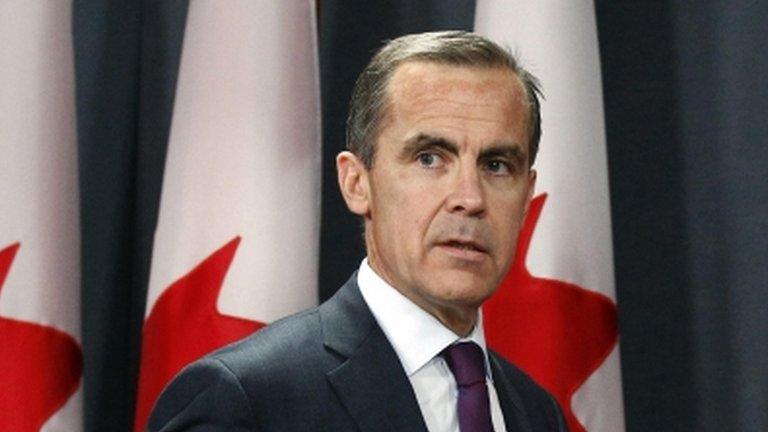Mark Carney named new Bank of England governor
- Published
- comments
Mark Carney: "I am very honoured and excited"
Mark Carney has been named as the new governor of the Bank of England by Chancellor George Osborne.
Mr Carney, the governor of the Canadian central bank, will serve for five years and will hold new regulatory powers over banks.
He was a surprise choice for the head of the UK's central bank and had previously ruled himself out.
The post is seen as one of the most important positions in the stewardship of the UK economy.
Current governor Sir Mervyn King steps down from the post next June.
Sir Mervyn said Mr Carney represented "a new generation of leadership for the Bank of England, and is an outstanding choice to succeed me".
'Critical time'
Mr Osborne told Parliament that Mr Carney, 47, would bring the "strong leadership and external experience the Bank needs" and added that the Canadian would apply for British citizenship.
He said Mr Carney was acknowledged as "the outstanding central banker of his generation".
During Mr Carney's five years as governor in Canada, Mr Osborne said he was "acknowledged to have weathered the economic storm better than any other major Western economy".
Mr Carney said he was "honoured to accept this important and demanding role" at a "critical time for the British, European and global economies".
He will serve in his current post until May next year. Mr Carney said he was "not without ties" to the UK - his wife is a dual national of the UK and Canada.
Shadow chancellor Ed Balls welcomed the incoming governor as a "good choice, good judgement".
Andrew Tyrie, chairman of the Treasury Select Committee, told the BBC that Mr Carney "ticks all the boxes" but added that his committee would question him on matters such as how he will approach macro-prudential stability and what his views on quantitative easing are.
The British Chambers of Commerce said it hoped that the new governor would "focus relentlessly on supporting business growth across the UK - not just in the Square Mile".
The CBI said Mr Carney's "strong track record as the Canadian central bank governor and extensive experience in international financial regulation mean that he is well positioned to guide Britain through challenging economic times".
Pay package
The term for a Bank governor is eight years. But the chancellor told Parliament that Mr Carney indicated he intended to serve for five years and to stand down at the end of June 2018.
"Mr Osborne was keen to get his preferred central governor, because Mr Carney was widely perceived to have all the bits: he is admired by monetary economists, regulators and - allegedly - his staff (or to put it another way, he is an unusual economist and central banker, in that he is seen as a half-decent manager)," the BBC's business editor Robert Peston said.
The governor of the Bank chairs the monetary policy committee, which has responsibility for setting interest rates in the UK.
George Osborne: "Mark Carney is acknowledged as the outstanding central banker of his generation"
Following the government's decision to scrap the Financial Services Authority and hand some of its responsibilities to the Bank, the governor will also oversee important regulatory powers as well.
Other candidates for the post included Bank deputy governor Paul Tucker, FSA chairman Lord Turner, Sir John Vickers, who led the government's recent review into breaking up the banks, and Santander bank's UK chairman Lord Burns.
Mr Tucker, who has spent most of his career with the Bank, was seen by many as the favourite for the job.
The BBC understands that Mr Carney will be offered a total pay package of about £624,000 a year.
Sir Mervyn's salary is £305,000 a year, but he receives much more generous pension contributions making his total pay and pension package worth about £519,000.
Mr Osborne also announced the re-appointment of Charlie Bean as Bank of England deputy governor for monetary stability for a further year until the end of June 2014.
- Published26 November 2012
